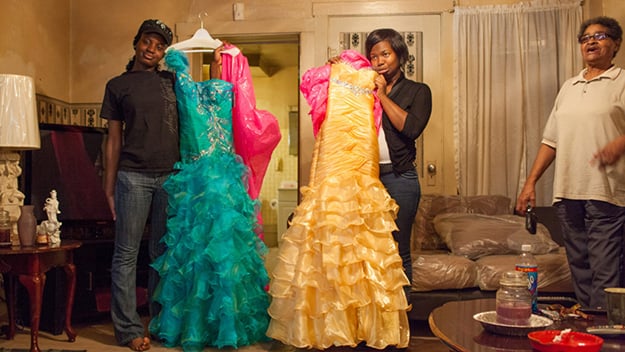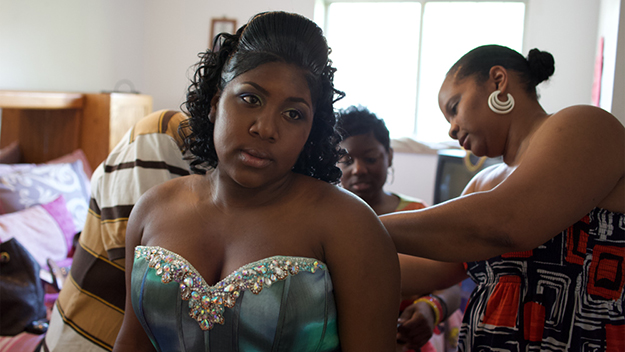Feeling Seen: Midnight in Paris

In 2012 the seniors at Flint Northern High School in Flint, Michigan had made it: They were graduating and, even more importantly, they were headed to prom. In a year their school would be closed. In two years, their city would come under nationwide scrutiny, for by the time they donned their gowns and caps, county officials had already announced plans to switch the city’s water source and begin the process that would expose hundreds of thousands to contaminated water.
In their winsome documentary Midnight in Paris—so named for prom’s theme that year—Roni Moore and James Blagden wisely revel in that tense, sanguine, altogether thrilling moment on the precipice of adulthood and leave the broader social connotations for the audience to sort out, or not. The film principally concerns itself with a handful students and their families as they make preparations for the dance. And if prom is a wonderfully cinematic, wonderfully American tradition, the teenagers who populate this film do not look like the teenagers we usually see on screen anticipating the joys (and disappointments) of the most famous night in American adolescence. Filmmakers don’t seem especially eager to tell this kind of story about black public school kids, and few could have resisted the implications Flint brought with it.
For all those former (like myself) and current black public school kids then, Moore and Blagden lovingly render a familiar portrait, from the classroom posters to the weary-eyed school administrators to the graffitied desk tops. In place of score, the film is punctuated with buoyant, brassy numbers from the school marching band. Over a svelte, well-paced 75 minutes, each student, all unnamed, emerges fully realized. They are all charming and real and hopelessly sure of themselves as only teenagers can be. The guys candidly confess their hopes for a prom night that includes weed and if they’re lucky—and many of them think they are—sex. Their dates, revealed in wry juxtaposition, have other plans.
In fact, Midnight in Paris is primarily a comedy, and laughter coursed through the screening room at its True/False 2019 premiere, where I saw the film. In the midst of the nail appointments, trips to the salon, buying sew-ins, coordinating colors and corsages, booking rides, hiccups, naturally, abound. For instance, one student hilariously recounts how she had to dump her date after he asked her if he could bring a second girl along with them. Moore and Blagden have managed such a cogent collage of adolescence that these small offenses—like an extremely delayed party bus—convincingly seem like colossal disasters. The reward for these little setbacks isn’t drama or suspense, but something, in this case, far more winning. Sometimes it takes an army of women to put a nervous girl in a dress, but that moment weighs just as much—if not more, in seven years—as the moment she wins prom queen.

With comedy, the film can also broach its more complicated truths. The seniors reflect frankly on the past four years. One student has taken up bow hunting. Another has had a child. Their families often join them for these interviews—to the embarrassment of their teenagers—in what at first seem merely endearing displays of intimacy, but over the course of the film come to deliver unexpected complexity. These mothers and fathers and grandmothers beam proudly into the cameras. They fret over the various traps still left to avoid, like drugs and all the inventive ways they’ve been warned this new and confusing generation have come up with to get high. Other parents take a more modern approach and prefer to supervise any drug and alcohol intake (and partake) themselves. But pride never leaves the frame. That their children have made it this far is not just a personal achievement, but a communal one.
Through the older generation, the film gets at some of its loftier questions, like what the future might actually entail for these otherwise preoccupied high schoolers. The somewhat jarring climax only makes sense in this context, when one father and his white girlfriend end up at the hotel where the students host their own informally organized after party. It’s a sequence that goes on a little too long. This girlfriend becomes a grim symbol of the world that awaits them, a harbinger of future intrusions as she insists that she wasn’t “raised” racist and, more credibly, that 25 isn’t old. In a way her presence becomes emblematic of the way no prom night can ever really hold up under the weight of youth’s impossible expectations.
The beauty of Moore and Blagden’s paean to this halcyon era lies then in its warmth, the care it takes with its subjects, the efforts to preserve the specificity of their experience and simultaneously bring the audience close to them. Cinema—documentary in particular—can sometimes feel like an apparatus designed to chart the suffering of black communities. A degree of relief still accompanies films such as last year’s Hale County, This Morning, This Evening, which, though not without its tragedies, ultimately celebrates the mundane over that seemingly more appealing “black” cinematic trait: resilience. Midnight in Paris, too, finds promise in the banal. It’s a testament to their craft that Moore and Blagden have spun such a compelling, rich tale out of ostensibly prosaic material. But perhaps what makes this a truly great film is how keenly it articulates that moment of transition, a parable of time itself and how all the deepest joys can be found there only after it’s gone.
Kelli Weston is a film and culture writer who has contributed to Sight & Sound, Little White Lies, and elsewhere.







